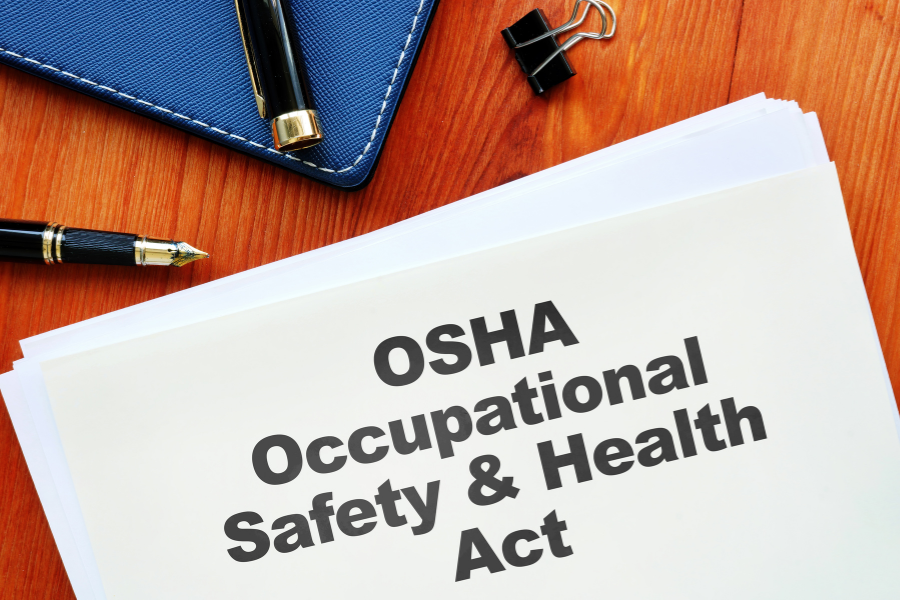OSHA requirements are extremely specific, until they aren’t. When it comes to the OSHA requirements for forklift training, the regulations may seem somewhat ambiguous. Fortunately, we’re here to clear away the confusion about how to become an OSHA certified forklift trainer.
The Occupational Safety and Health Administration (OSHA) requires every forklift driver to be certified to operate the machine they use. However, this begs the question once posed by a Comedian (and, sure, a first-century Roman poet), “Who watches the watchmen?” However, in our case, the question is, “Who trains the trainers?”
OSHA requirements forklift certification
OSHA regulation 1910.178(l)(1)(i) states that an “employer shall ensure that each powered industrial truck operator is competent to operate a powered industrial truck safely, as demonstrated by the successful completion of the training and evaluation,” which is pretty straightforward. OSHA also requires all operators to take a refresher training course and undergo an evaluation at least once every three years.
Further on, regulation 1910.178(l)(2)(i)(A) elaborates that the training needs to be “under the direct supervision of persons who have the knowledge, training, and experience to train operators and evaluate their competence.” It also states in regulation 1910.178(l)(2)(ii) that “training shall consist of a combination of formal instruction (e.g., lecture, discussion, interactive computer learning, video tape, written material), practical training (demonstrations performed by the trainer and practical exercises performed by the trainee), and evaluation of the operator’s performance in the workplace.”
Ultimately, an employer has two options to ensure their workers are appropriately trained on their industrial trucks. The first is to have their employees take a third-party OSHA forklift operator certification course specializing in forklift instructor training. The second is to create their own course and ensure that their instructor meets the OSHA trainer certification requirements.
How to become forklift trainer
So, how do you know the exact OSHA fork lift regulations for something like 1910.178(l)(2)(iii), which states, “All operator training and evaluation shall be conducted by persons who have the knowledge, training and experience to train powered industrial truck operators and evaluate their competence.”
That seems very broad. What does “knowledge, training and experience to train powered industrial truck operators” specifically mean? Well, in most cases, forklift certification trainers learn on the job and then pass their years of experience to other employees. Here’s a comprehensive list of the OSHA forklift standards for an OSHA trainer certification.
An OSHA-approved forklift trainer needs to be comfortable with the:
- Controls for the specific industrial trucks used by the operator, including:
- Steering.
- Instrumentation.
- Motor operation.
- Vehicle capacity.
- Vehicle stability.
- Refueling and/or battery charging and recharging.
- Visibility, including potential restrictions due to loading.
- Operating the forks and any attachments, including:
- The composition of loads to be carried.
- Load stability.
- Load manipulation, stacking and unstacking.
- Required inspections and maintenance.
- Warnings and precautions listed in the operator’s manual.
- OSHA forklift violations.
A trainer should also know specific workplace-related topics, such as
- Surface conditions, including ramps and other sloped surfaces.
- General aisle width.
- Narrow, hazardous or forklift-restricted areas.
- The flow of pedestrian traffic.
In addition, forklift trainers need to be familiar with the latest OSHA compliance requirements and be able to adapt their training to remain up-to-date.
Evaluating a potential trainer
If you’re an employer looking for an in-house forklift certification trainer, there are certain skills that an OSHA qualified trainer needs. A forklift trainer is responsible for:
- Developing the company’s operator training standards.
- Instructing inexperienced workers how to drive a forklift.
- Evaluating trainees on their performance.
- Knowing how to operate all the workplace’s forklifts and remaining up to date on new models and upgrades.
- Helping to maintain a safe and secure workplace by informing trainees about federal and state OSHA health and safety standards.
- Understanding and keeping the company informed of training styles and instructional techniques best practices.
- Monitoring the employees’ performance and holding recertification courses when necessary (which is every three years unless someone’s performance indicates they need some refresher instruction earlier).
Let’s review some of these crucial qualifications in greater detail.
Training styles and instructional techniques best practices
There are many different instructional styles and techniques, and some of them are not great. Just because someone is a good forklift operator does not mean they will be a good instructor.
The best learning environment is one that is supportive and encouraging. This means that instructors need patience and must remember that their trainees know less than the instructors. That’s the entire point of training. It can be easy to become frustrated, especially when an instructor repeatedly sees the same mistakes. However, it is essential to remember that mistakes are part of learning.
A trainer needs to prepare both classroom theory learning sessions and hands-on practical sessions. Both courses should be captivating and educational to maintain the highest level of engagement and retention.
How to operate a forklift
There’s a trick to teaching someone how to operate anything, whether it’s driving a car, connecting a printer to the internet or operating a forklift: patience. You can’t just jump on a machine and say, “You push this button here, pull this lever here and press this peddle here,” and expect someone to be good to go.
Instead, you must calmly go through how to operate a forklift safely. Remember, an instructor is also in charge of holding recertification courses. Drivers are required to renew their certification every three years. However, there are instances when an operator may need to take a refresher course sooner than three years, such as if they are observed operating the vehicle in an unsafe manner, they are in an accident or a near-miss incident, or they receive a negative evaluation.
Safety guidelines
Careless and unsafe driving is the cause of most forklift accidents and fatalities. Imparting the importance of safe driving is an essential task for OSHA forklift operator certification, including:
- Identifying hazards.
- Preventing accidents.
- Inspecting the forklift every day.
- Mastering various forklift safety tips.
- Understanding the available personal protective equipment (PPE) and when to use it.
- Knowing why one must follow all safety regulations.
Federal and state OSHA forklift standards
Trainers need to remain up to date on the latest OSHA forklift standards. Most of the federal OSHA standards that trainers need to know are for powered industrial trucks (29 CFR 1910.178) and material handling equipment (29 CFR 1926.602). In addition, there may also be state-specific standards that trainers need to know (in general, Texas does not stray from the federal OSHA standards, but always double-check if you have a question).
Operator evaluations for recertification
According to OSHA standard 1910.178(l)(4)(iii), “an evaluation of each powered industrial truck operator’s performance shall be conducted at least once every three years.”
A forklift trainer needs to be able to evaluate an operator’s performance based on the following criteria:
- How thoroughly they perform the pre-op inspection.
- Their skill when picking up and dropping off cargo.
- The care they take when traveling with and without a load.
- How carefully they park the vehicle.
- If they follow proper procedures when refilling and recharging the forklift.
We hope this has cut through the confusion of how to become an OSHA certified forklift trainer. If you have any more questions, the experts at Texas Motive Solutions, are ready to help. Don’t forget to ask about our complimentary forklift fleet performance analysis and how we can help you discover the perfect forklift batteries and accessories for your fleet.
Give us a call at (888) 316-2459 or fill out this form to discover everything Texas Motive Solutions can do for you.



